Premium Only Content
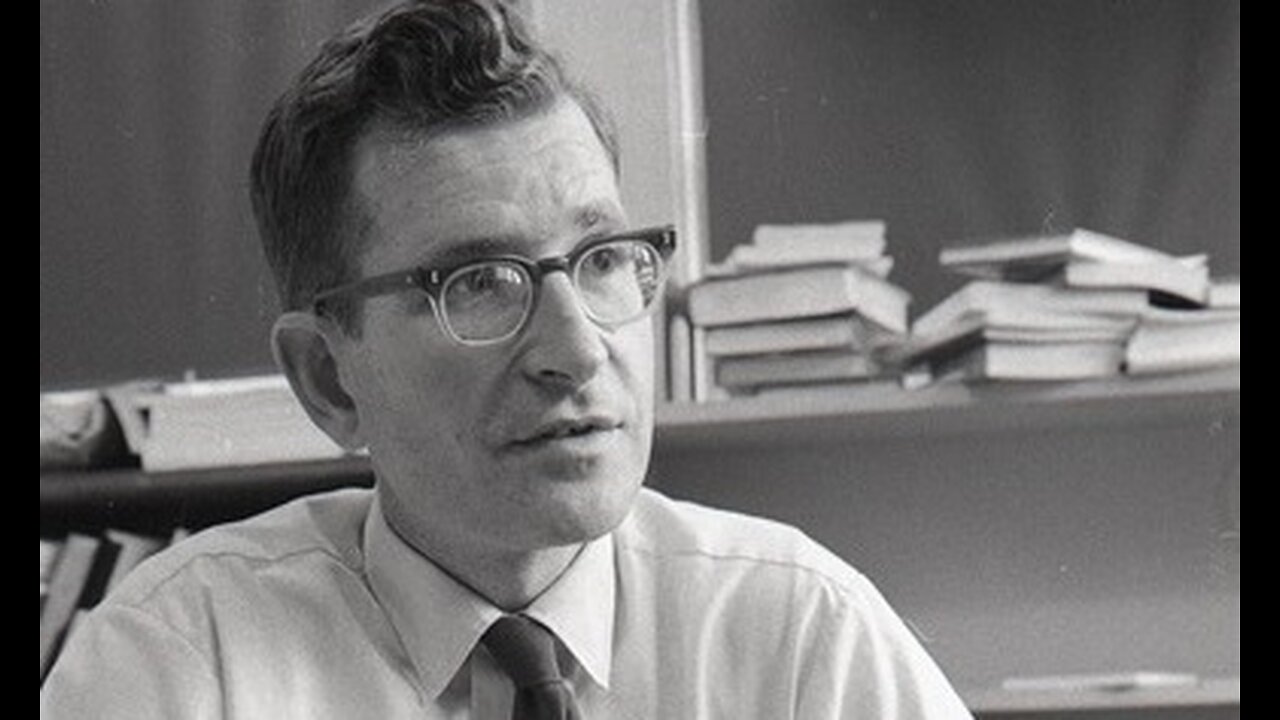
"Turn the whole country into a kind of an automated murder machine": Noam Chomsky (1970)
Noam Chomsky is a renowned linguist, philosopher, and political activist who has contributed significantly to the fields of linguistics, cognitive psychology, and political science. In 1970, Chomsky published his influential book, "American Power and the New Mandarins," which offered a critical analysis of U.S. foreign policy during the Vietnam War era.
The book was a significant departure from Chomsky's earlier linguistic work, as it focused primarily on political issues. In "American Power and the New Mandarins," Chomsky argued that the United States was engaging in imperialistic policies under the guise of promoting democracy and freedom. He criticized the U.S. government's involvement in the Vietnam War, pointing out the hypocrisy of claiming to support democracy while suppressing democratic movements in other countries.
Chomsky's book was well-received by many on the political left and sparked a renewed interest in activism and protest against the Vietnam War. It also brought Chomsky to the forefront of political discourse, as he became a prominent voice in the anti-war movement.
American Power and the New Mandarins is a book by the US academic Noam Chomsky, largely written in 1968, published in 1969. It was his first political book and sets out in detail his opposition to the Vietnam War.[1]
Overview
Chomsky develops the proposition, laid out in The Responsibility of Intellectuals, that the American intellectual and technical class, in universities and in government (the New Mandarins), bear major responsibility for the atrocities perpetrated by the United States in Vietnam.
He argues, moreover, that US policy in Vietnam was all too "successful." In his view, US policy was to destroy the nationalist movements in the South Vietnamese peasantry rather than to defend South Vietnam from North Vietnamese aggression. He holds that the former was accomplished rather "successfully" at the expense of the latter.
His fundamental point on the New Mandarins is that we should not uncritically accept the claim that technocratic approaches are neutral and beneficial. He writes: 'Quite generally, what grounds are there for supposing that those whose claim to power is based on knowledge and technique will be more benign in their exercise of power than those whose claim is based on wealth or aristocratic origin? On the contrary, one might expect the new mandarin to be dangerously arrogant, aggressive and incapable of adjusting to failure, as compared with his predecessor, whose claim to power was not diminished by honesty as to the limitations of his knowledge, lack of work to do or demonstrable mistakes.'[2]
He also suggests that common presumptions about the greatness of the West and the modern age are misguided. He writes that these assumptions are created automatically regardless of real social conditions: 'one would expect any group with access to power and affluence to construct an ideology that will justify this state of affairs on the grounds of the general welfare.'[3]
The book was reprinted by The New Press in 2002 and contains a new foreword by Howard Zinn,[4] an American historian and the author of A People's History of the United States.
Synopsis
Chomsky predicts that Vietnamese opposition to U.S. involvement in the war would continue and that the U.S. would be unable to defeat the Viet Cong. He explains that many of the chapters of this book originated as articles or lectures that he gave during his involvement in the still-ongoing anti-war movement. From a moralistic perspective, his primary insight in this work was that "by accepting the presumption of legitimacy of debate on certain issues, one has already lost one's humanity."[5]
Chomsky saw a Viet Cong victory in the war to be inevitable.[6]
Publication
New York, Pantheon Books [1969]
United Kingdom, Pelican Books [1969]
New York, The New Press [2002]
References
Chomsky, Noam (1969). American Power and the New Mandarins. Pantheon Books.
Chomsky, Noam (1969). American Power and the New Mandarins. Pantheon Books. p. 26.
Chomsky, Noam (1969). American Power and the New Mandarins. Pantheon Books. p. 27.
Chomsky, Noam (2002). American Power and the New Mandarins. The New Press. ISBN 1-56584-775-X.
Chomsky 2002, pp. 3–22.
Chomsky 2002, p. 4.
https://en.wikipedia.org/wiki/American_Power_and_the_New_Mandarins
Chomsky joined protests against U.S. involvement in the Vietnam War in 1962, speaking on the subject at small gatherings in churches and homes.[77] His 1967 critique of U.S. involvement, "The Responsibility of Intellectuals", among other contributions to The New York Review of Books, debuted Chomsky as a public dissident.[78] This essay and other political articles were collected and published in 1969 as part of Chomsky's first political book, American Power and the New Mandarins.[79] He followed this with further political books, including At War with Asia (1970), The Backroom Boys (1973), For Reasons of State (1973), and Peace in the Middle East? (1974), published by Pantheon Books.[80] These publications led to Chomsky's association with the American New Left movement,[81] though he thought little of prominent New Left intellectuals Herbert Marcuse and Erich Fromm and preferred the company of activists to that of intellectuals.[82] Chomsky remained largely ignored by the mainstream press throughout this period.[83]
He also became involved in left-wing activism. Chomsky refused to pay half his taxes, publicly supported students who refused the draft, and was arrested while participating an anti-war teach-in outside the Pentagon.[84] During this time, Chomsky co-founded the anti-war collective RESIST with Mitchell Goodman, Denise Levertov, William Sloane Coffin, and Dwight Macdonald.[85] Although he questioned the objectives of the 1968 student protests,[86] Chomsky gave many lectures to student activist groups and, with his colleague Louis Kampf, ran undergraduate courses on politics at MIT independently of the conservative-dominated political science department.[87] When student activists campaigned to stop weapons and counterinsurgency research at MIT, Chomsky was sympathetic but felt that the research should remain under MIT's oversight and limited to systems of deterrence and defense.[88] Chomsky has acknowledged that his MIT lab's funding at this time came from the military.[89] He later said he considered resigning from MIT during the Vietnam War.[90] There has since been a wide-ranging debate about what effects Chomsky's employment at MIT had on his political and linguistic ideas.[91]
External images
Chomsky participating in the anti-Vietnam War March on the Pentagon, October 21, 1967
image icon Chomsky with other public figures
image icon The protesters passing the Lincoln Memorial en route to the Pentagon
Because of his anti-war activism, Chomsky was arrested on multiple occasions and included on President Richard Nixon's master list of political opponents.[92] Chomsky was aware of the potential repercussions of his civil disobedience, and his wife began studying for her own doctorate in linguistics to support the family in the event of Chomsky's imprisonment or joblessness.[93] Chomsky's scientific reputation insulated him from administrative action based on his beliefs.[94] In 1970 he visited southeast Asia to lecture at Vietnam's Hanoi University of Science and Technology and toured war refugee camps in Laos. In 1973 he helped lead a committee commemorating the 50th anniversary of the War Resisters League.[95]
His work in linguistics continued to gain international recognition as he received multiple honorary doctorates.[96] He delivered public lectures at the University of Cambridge, Columbia University (Woodbridge Lectures), and Stanford University.[97] His appearance in a 1971 debate with French continental philosopher Michel Foucault positioned Chomsky as a symbolic figurehead of analytic philosophy.[98] He continued to publish extensively on linguistics, producing Studies on Semantics in Generative Grammar (1972),[94] an enlarged edition of Language and Mind (1972),[99] and Reflections on Language (1975).[99] In 1974 Chomsky became a corresponding fellow of the British Academy.[97]
-
 31:00
31:00
The Memory Hole
1 month agoThe Perils of a Life of Dirty Tricks in the CIA (1978)
1.05K -
 1:01:08
1:01:08
SNEAKO
4 hours agoFRIDAY NIGHT VIBES
25.6K -
 1:16:47
1:16:47
Talk Nerdy 2 Us
10 hours agoTrump’s Biggest Sign, Sticker Mule’s Secrets & The Cybersecurity Threats They Don’t Want You to Know
11.3K5 -
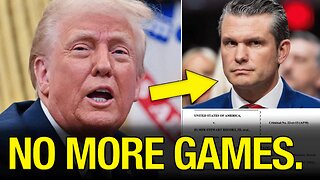 4:57:20
4:57:20
Robert Gouveia
8 hours agoHegseth Final Vote; Trump SLAPS Biased D.C. Judge; Rebuilding North Carolina
31.3K55 -
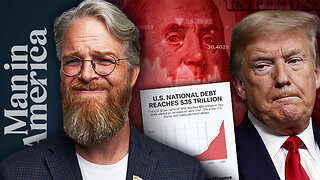 47:40
47:40
Man in America
8 hours agoCan Trump Avert Economic Disaster Amid a $35T Debt Crisis? w/ Collin Plume
52.2K8 -
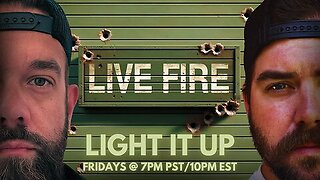 LIVE
LIVE
I_Came_With_Fire_Podcast
12 hours ago🔥🔥Trump’s FIRST WEEK, FTOs, Deportations, & JFK FILES🔥🔥
543 watching -
 5:26:14
5:26:14
Barry Cunningham
8 hours agoTRUMP DAILY BRIEFING: PETE HEGSETH & KRISTI NOEM CONFIRMATIONS - TRUMP IN CALIFORNIA!
27.4K26 -
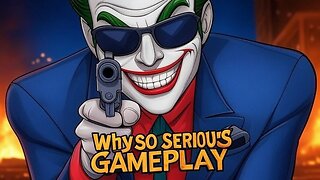 2:06:17
2:06:17
Joker Effect
3 hours agoWhy So Serious Gameplay: Making scrubs in Brawlhalla cry baby tears.
16.6K3 -
 1:24:02
1:24:02
Roseanne Barr
7 hours ago $15.76 earnedDaddy's Home | The Roseanne Barr Podcast #84
44.8K67 -
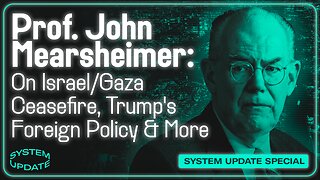 1:31:05
1:31:05
Glenn Greenwald
7 hours agoProf. John Mearsheimer on Israel/Gaza Ceasefire, Trump's Foreign Policy, Ukraine, Free Speech Crackdowns & More | SYSTEM UPDATE #396
75.8K57